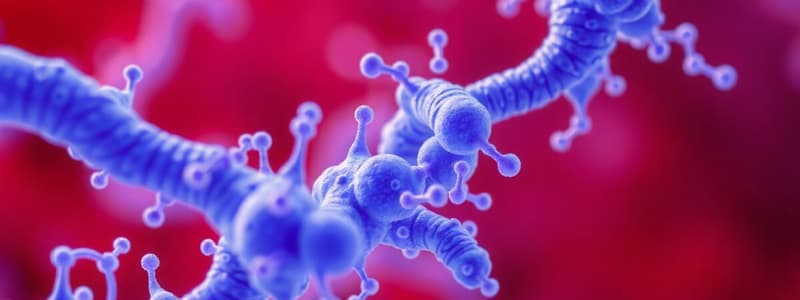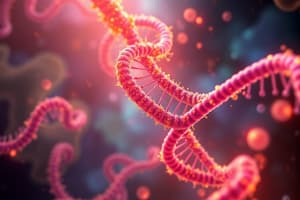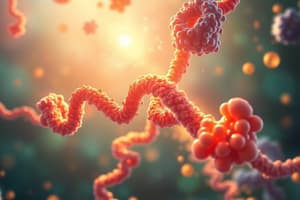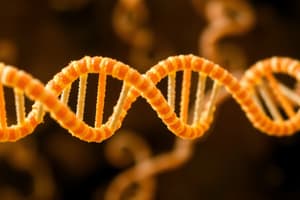Podcast
Questions and Answers
What role does the ribosome-binding site play in bacterial translation?
What role does the ribosome-binding site play in bacterial translation?
- It binds to the stop codon.
- It provides a location for ribosomes to begin translation. (correct)
- It identifies the terminator sequence.
- It initiates the transcription process.
Which of the following correctly describes the stop codon in translation?
Which of the following correctly describes the stop codon in translation?
- It is always the first codon in the mRNA sequence.
- It designates the end of polypeptide synthesis. (correct)
- It determines the start sequence of the mRNA.
- It signals the beginning of transcription.
During the initiation stage of transcription, what is the primary role of transcription factors?
During the initiation stage of transcription, what is the primary role of transcription factors?
- They enable RNA polymerase to bind to the promoter. (correct)
- They synthesize RNA independently of RNA polymerase.
- They assist in denaturing the DNA duplex.
- They degrade mRNA after synthesis.
What happens during the elongation stage of transcription?
What happens during the elongation stage of transcription?
What is formed when the DNA strands are separated during transcription initiation?
What is formed when the DNA strands are separated during transcription initiation?
What is the outcome when RNA polymerase reaches a terminator during transcription?
What is the outcome when RNA polymerase reaches a terminator during transcription?
Which of the following statements is true regarding the start codon?
Which of the following statements is true regarding the start codon?
Which protein complex is essential for the initiation of transcription?
Which protein complex is essential for the initiation of transcription?
What is the primary function of TFIID in the transcription process?
What is the primary function of TFIID in the transcription process?
How many subunits compose TFIID?
How many subunits compose TFIID?
Which general transcription factor is responsible for attracting and regulating TFIIH?
Which general transcription factor is responsible for attracting and regulating TFIIH?
What does TFIIH primarily do at the transcription start point?
What does TFIIH primarily do at the transcription start point?
What effect does the binding of the stem-loop structure have on RNA polymerase during transcription termination?
What effect does the binding of the stem-loop structure have on RNA polymerase during transcription termination?
Which factor binds to TFIID and stabilizes its interaction with the TATA box?
Which factor binds to TFIID and stabilizes its interaction with the TATA box?
What is the role of the ρ protein during transcription termination?
What is the role of the ρ protein during transcription termination?
How does TFIIF assist RNA polymerase II during transcription initiation?
How does TFIIF assist RNA polymerase II during transcription initiation?
Which feature differentiates the ρ-independent termination from the ρ-dependent termination?
Which feature differentiates the ρ-independent termination from the ρ-dependent termination?
Which transcription factor is known to position RNA polymerase II at the transcription start site?
Which transcription factor is known to position RNA polymerase II at the transcription start site?
What occurs immediately after the synthesis of the RNA sequence?
What occurs immediately after the synthesis of the RNA sequence?
What stabilizes the pause of RNA polymerase during the ρ-independent termination?
What stabilizes the pause of RNA polymerase during the ρ-independent termination?
What role does TFIIE play in the open complex formation?
What role does TFIIE play in the open complex formation?
What is a primary characteristic of the stem-loop structure formed during transcription?
What is a primary characteristic of the stem-loop structure formed during transcription?
During ρ-independent termination, what occurs to the uracil-rich sequence in the RNA transcript?
During ρ-independent termination, what occurs to the uracil-rich sequence in the RNA transcript?
What is the consequence of the RNA transcript dissociating from the DNA template?
What is the consequence of the RNA transcript dissociating from the DNA template?
What is the primary direction in which RNA polymerase synthesizes RNA during transcription?
What is the primary direction in which RNA polymerase synthesizes RNA during transcription?
Which mechanism of termination involves an RNA-binding protein known as rho (ρ)?
Which mechanism of termination involves an RNA-binding protein known as rho (ρ)?
What prevents the dissociation of RNA polymerase from the template strand during transcription elongation?
What prevents the dissociation of RNA polymerase from the template strand during transcription elongation?
How does RNA polymerase connect nucleotides during transcription?
How does RNA polymerase connect nucleotides during transcription?
Which statement about transcription directionality is correct?
Which statement about transcription directionality is correct?
What role does the rut site play in rho-dependent termination?
What role does the rut site play in rho-dependent termination?
Which of the following best describes the speed of RNA synthesis?
Which of the following best describes the speed of RNA synthesis?
In transcription termination, what occurs when the RNA-DNA hybrid region is separated?
In transcription termination, what occurs when the RNA-DNA hybrid region is separated?
What is the significance of the promoter in gene expression?
What is the significance of the promoter in gene expression?
What sequence is recognized at the -10 site in the E. coli promoter?
What sequence is recognized at the -10 site in the E. coli promoter?
How are nucleotides numbered in relation to the transcription start site?
How are nucleotides numbered in relation to the transcription start site?
What forms the RNA polymerase holoenzyme in E. coli?
What forms the RNA polymerase holoenzyme in E. coli?
What nucleotide is designated as +1 in the conventional numbering system?
What nucleotide is designated as +1 in the conventional numbering system?
What is referred to as the consensus sequences?
What is referred to as the consensus sequences?
Which of the following statements is NOT true regarding the conventional numbering of nucleotides?
Which of the following statements is NOT true regarding the conventional numbering of nucleotides?
Which protein initiates the transcription process by recognizing the promoter?
Which protein initiates the transcription process by recognizing the promoter?
What is the primary role of TFIIB in the transcription initiation process?
What is the primary role of TFIIB in the transcription initiation process?
Which component of the transcription machinery is specifically responsible for helicase activity?
Which component of the transcription machinery is specifically responsible for helicase activity?
What event occurs immediately after the transcription of the polyadenylation signal sequence?
What event occurs immediately after the transcription of the polyadenylation signal sequence?
What is the main function of the carboxyl-terminal domain (CTD) of RNA polymerase II?
What is the main function of the carboxyl-terminal domain (CTD) of RNA polymerase II?
Which subunits are involved in forming the closed complex in eukaryotic transcription?
Which subunits are involved in forming the closed complex in eukaryotic transcription?
What is the consequence of CTD phosphorylation during transcription initiation?
What is the consequence of CTD phosphorylation during transcription initiation?
What sequence is crucial for directing the cleavage of mRNA during polyadenylation?
What sequence is crucial for directing the cleavage of mRNA during polyadenylation?
Which of the following statements about TFIID is accurate?
Which of the following statements about TFIID is accurate?
Flashcards
Ribosome-binding site
Ribosome-binding site
A short sequence on mRNA that marks the starting point for ribosome binding, crucial for initiating translation.
Codon
Codon
Three consecutive nucleotides on mRNA that code for a specific amino acid.
Start codon
Start codon
The first codon in mRNA that signals the start of protein synthesis.
Stop codon
Stop codon
Signup and view all the flashcards
Transcription
Transcription
Signup and view all the flashcards
Transcription initiation
Transcription initiation
Signup and view all the flashcards
Transcription elongation
Transcription elongation
Signup and view all the flashcards
Transcription termination
Transcription termination
Signup and view all the flashcards
Promoter
Promoter
Signup and view all the flashcards
Transcription start site
Transcription start site
Signup and view all the flashcards
Conventional promoter numbering
Conventional promoter numbering
Signup and view all the flashcards
Consensus sequences
Consensus sequences
Signup and view all the flashcards
TATAAT sequence
TATAAT sequence
Signup and view all the flashcards
RNA polymerase
RNA polymerase
Signup and view all the flashcards
RNA polymerase holoenzyme
RNA polymerase holoenzyme
Signup and view all the flashcards
Sigma factor
Sigma factor
Signup and view all the flashcards
Terminator
Terminator
Signup and view all the flashcards
Rho protein
Rho protein
Signup and view all the flashcards
Rut site
Rut site
Signup and view all the flashcards
Rho-independent Termination
Rho-independent Termination
Signup and view all the flashcards
Rho-dependent Termination
Rho-dependent Termination
Signup and view all the flashcards
RNA-DNA hybrid
RNA-DNA hybrid
Signup and view all the flashcards
What causes RNA polymerase to pause during transcription termination?
What causes RNA polymerase to pause during transcription termination?
Signup and view all the flashcards
What is a stem-loop in transcription termination?
What is a stem-loop in transcription termination?
Signup and view all the flashcards
What does the ρ protein do during transcription termination?
What does the ρ protein do during transcription termination?
Signup and view all the flashcards
What is ρ-dependent termination?
What is ρ-dependent termination?
Signup and view all the flashcards
What is ρ-independent termination?
What is ρ-independent termination?
Signup and view all the flashcards
What is the role of the uracil-rich sequence in ρ-independent termination?
What is the role of the uracil-rich sequence in ρ-independent termination?
Signup and view all the flashcards
What is the role of NusA in ρ-independent termination?
What is the role of NusA in ρ-independent termination?
Signup and view all the flashcards
What is a terminator sequence in transcription?
What is a terminator sequence in transcription?
Signup and view all the flashcards
Polyadenylation
Polyadenylation
Signup and view all the flashcards
Polyadenylation signal sequence
Polyadenylation signal sequence
Signup and view all the flashcards
Polyadenylation signal
Polyadenylation signal
Signup and view all the flashcards
DNA unwinding
DNA unwinding
Signup and view all the flashcards
Mediator
Mediator
Signup and view all the flashcards
Carboxyl-terminal domain (CTD)
Carboxyl-terminal domain (CTD)
Signup and view all the flashcards
TFIID
TFIID
Signup and view all the flashcards
TFIIA
TFIIA
Signup and view all the flashcards
TFIIB
TFIIB
Signup and view all the flashcards
TFIIF
TFIIF
Signup and view all the flashcards
TFIIE
TFIIE
Signup and view all the flashcards
TFIIH
TFIIH
Signup and view all the flashcards
TFIID's Role
TFIID's Role
Signup and view all the flashcards
Transcription Factors
Transcription Factors
Signup and view all the flashcards
Study Notes
Molecular Biology I - BIO316, Lecture 7
-
Gene Transcription Overview: Genetic material stores information for living organisms; this information is contained in genes, segments of DNA that code for functional products (RNA or polypeptide).
-
Transcription process: Transcription produces an RNA copy (mRNA) of a gene. mRNA carries the information for creating a polypeptide. A polypeptide assembles into a functional protein.
-
DNA Replication: DNA makes copies of itself, transmitting it from one cell to the next and from parent to offspring.
-
Prokaryotic vs. Eukaryotic Transcription: Gene transcription in prokaryotes is simpler than in eukaryotes. Eukaryotic cells—larger than prokaryotic—contain multiple compartments and organelles.
-
Protein-coding genes: These genes provide information for polypeptide synthesis, forming proteins essential for organismal functions. Transcription of a protein-coding gene generates mRNA as the initial product.
-
Gene Expression: Gene expression is the overall mechanism through which information encoded in a gene is utilized to produce a functional protein.
-
Promoter & Terminator: The promoter site signals the start of transcription, offering an initiation point. The terminator site marks the end of the transcription process.
-
Regulatory elements: These DNA segments control transcription rates.
-
Transcription Factors: Proteins that bind to genes and regulate the rate of transcription. Some bind directly to the promoter.
-
mRNA Structure: mRNA contains a sequence of codons (three-nucleotide units) that specify particular amino acids. Each codon encodes an amino acid.
Stages of Transcription
-
Initiation:
- The promoter region acts as a recognition site for transcription factors.
- Transcription factors enable RNA polymerase to bind to the promoter.
- DNA denatures to form an open complex, facilitating RNA synthesis.
-
Elongation:
- RNA polymerase moves along the DNA template strand.
- RNA polymerase synthesizes a complementary RNA strand from the template DNA.
- Synthesis occurs in the 5' to 3' direction, using nucleotides.
-
Termination:
- RNA polymerase encounters a terminator sequence.
- RNA polymerase and the newly formed RNA transcript detach from the DNA.
Transcription in Prokaryotes
-
Promoters: In prokaryotes, promoters have a -35 consensus and -10 consensus sequence. Promoters are upstream from the transcription start site.
-
RNA Polymerase: The enzyme that catalyzes mRNA synthesis. RNA polymerase in prokaryotes are made up of five core subunits.
-
Holoenzyme: The sigma (σ) factor associates with the RNA polymerase core enzyme to form the holoenzyme. The sigma factor helps the RNA polymerase recognize the promoter.
-
Transcription Start Site (+1): This is where transcription begins the coding strand nucleotide +1 is where the transcript starts.
Transcription in eukaryotes
-
RNA Polymerases: Eukaryotes have three RNA polymerases (I, II, and III). Each polymerase transcribes distinct types of genes.
-
TATA Box: A critical sequence within the core promoter, often found in eukaryotic genes, helps RNA polymerase recognize and bind to the promoter regions.
-
Regulatory elements (Enhancers & Silencers): DNA segments that influence transcription rates. Activators bind to enhancers to stimulate transcription; repressors bind to silencers to repress transcription.
General transcription factors (GTFs)
-
Multiple subunits: RNA polymerase II consists of several subunits.
-
TBP: The TATA binding protein is one of the protein subunits within the TFIID protein complex. It plays a critical role in recognizing the core promoter.
-
Mediator complex: Mediator is a multiprotein complex that facilitates basal transcription by interacting with RNA polymerase II, general transcription factors, and regulatory transcription factors (activators and repressors). Mediator influences transcription by affecting TFIIH's ability to phosphorylate the RNA polymerase II CTD (carboxyl terminal domain).
Transcription Termination
-
Prokaryotic Termination: Rho-dependent termination involves the rho protein and a rut site on RNA; rho-independent involves DNA/RNA stem loops.
-
Eukaryotic Termination: Termination occurs after cleavage of the transcript downstream of the polyadenylation signal and involves cleavage followed by addition of adenine nucleotides to the newly produced RNA. Two models (allosteric and torpedo) describe this process.
Studying That Suits You
Use AI to generate personalized quizzes and flashcards to suit your learning preferences.




